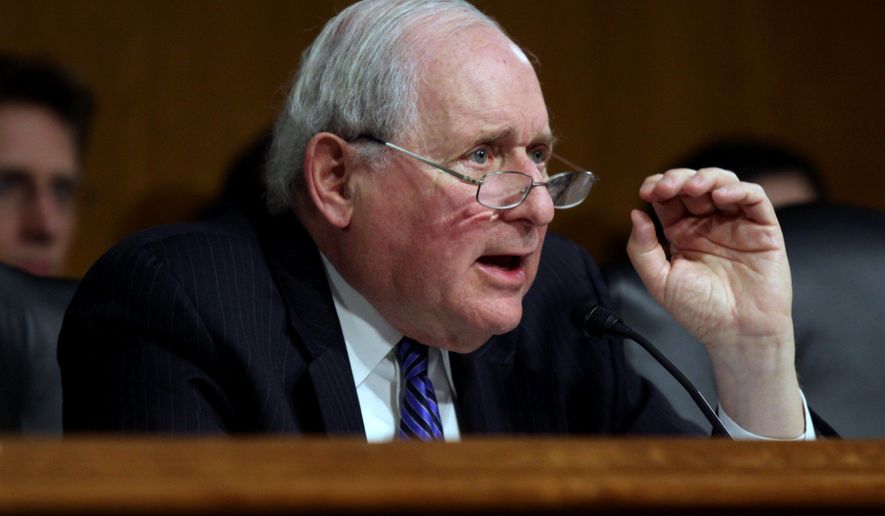Congressional negotiators have reached a deal on the annual defense policy bill, the chairman of the Senate Armed Services Committee said Monday evening, adding that he lost his bid to loosen restrictions on transferring detainees from Guantanamo Bay prison.
“We will have a bill announcement tomorrow morning,” Sen. Carl Levin, Michigan Democrat, told reporters. “We still have to present it to our bodies. Obviously that’s not a minor issue.”
Mr. Levin, who is working to complete his final annual authorization bill before retiring at the end of the year, said both sides made compromises to get the bill done in the few remaining weeks Congress is in session.
“There’s a lot of issues we resolved,” he said. “We compromised. Both of us obviously it takes two, not just to tango, but to compromise.”
When asked whether he prevailed on the issue of transferring terrorism suspects from a prison on the naval base in Cuba, which was included in the Senate bill but not the House’s version, Mr. Levin said no.
“I can only say our language, both the amendments both on Guantanamo and Yemen, will not be in there,” he said.
Mr. Levin did not detail what the final bill will say, but the largest discrepancy between the two bills on Guantanamo dealt with whether detainees would be allowed to come to the U.S. for emergency medical treatment. The senior medical officer at the base would make the call on the immediacy of care required and on the prohibitive cost of providing care in Cuba.
The Senate version allowed for the transfer, but the House version didn’t.
“It’s something the administration has been arguing for for a while. It actually is incredibly costly to not just fly medical personnel but also relevant equipment to Guantanamo,” Steve Vladeck, a law professor at American University, said. “It’s actually much more efficient to move the prisoner.”
After recent transfers, there are 142 prisoners being held at the detention facility, according to the New York Times. A transfer exception for only severe medical reasons would only apply to a few detainees, Mr. Vladeck said, but it would still be a departure from current law that does not allow detainees on American soil — no exceptions.
The House version of the annual defense authorization extended a ban on providing any funding to transfer prisoners to the U.S. or to update U.S. facilities to hold prisoners.
The Senate version also included a ban on transferring prisoners to Yemen, which Mr. Levin also said will not be included in the compromise.
Mr. Vladeck said some lawmakers may want to stop transfers to Yemen because they do not believe the Yemeni government can keep the men from returning to Islamist and other terror groups.
“I think the concern is that the security situation in Yemen is sufficiently unstable, whereas we’re relatively comfortable about detainees cleared for release in other countries because we have faith in other countries to keep an eye on those men,” he said. “Plenty of members of Congress who don’t have such faith in Yemeni government.”
The Yemeni government, which is battling both Sunni-led Al-Qaeda groups and Iran-backed Shiite militias, does not effectively control much of the country and has even had to battle insurgents inside the capital city.
• Jacqueline Klimas can be reached at jklimas@washingtontimes.com.




Please read our comment policy before commenting.